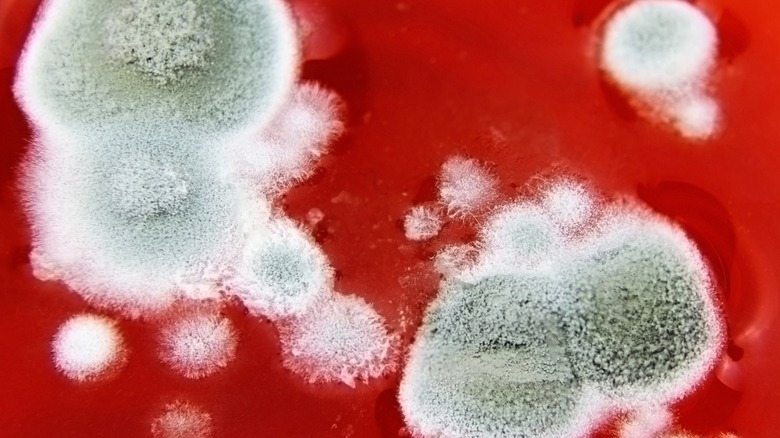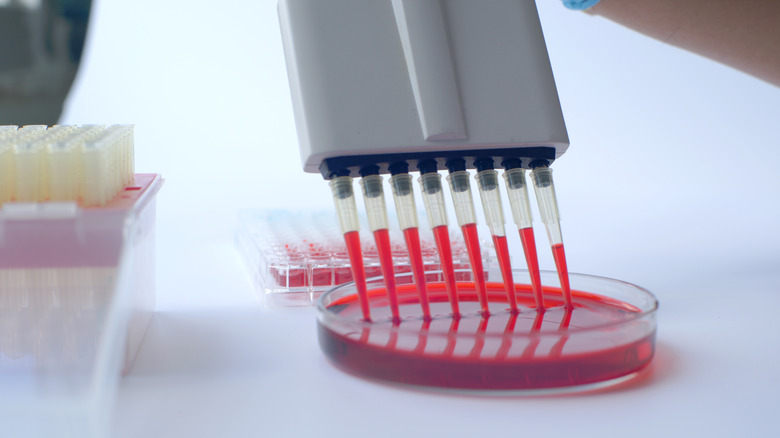What It Means When Your Hemoglobin Count Is High
According to a 2019 study published in the journal InformedHealth, about 55% of your blood is plasma, while different blood cells make up the remaining 45%. Blood cells come in two types: red blood cells (or erythrocytes) and white blood cells (or leukocytes), as explained by the American Society of Hematology. Red blood cells contain a protein known as hemoglobin, which transports oxygen from the lungs to the rest of the body, per the society.
Abnormal quantities of hemoglobin, whether low or high, might be a health concern. According to the Cleveland Clinic, taking a blood test is the only way to determine whether your hemoglobin levels are high or low. Hemoglobin levels may differ between males, females, and children. According to the Mayo Clinic, for adult males, a healthy range is between 13.2 to 16.6 grams per deciliter. For women, the ideal range is between 11.6 to 15 grams per deciliter.
Lower than normal hemoglobin levels usually indicate anemia, per the Mayo Clinic, but what does it mean when your hemoglobin count is high? Furthermore, what can you do about it? Let's explore the causes of high hemoglobin and the various treatment options.
What causes high hemoglobin levels?
According to Healthline, a high hemoglobin count is characterized by too many red blood cells, leading to a condition known as polycythemia. Several factors can cause high hemoglobin levels — even your geographic location can be a risk factor, as explained in this 2007 study published in the Postgraduate Medical Journal. People who live at a high altitude may experience an increase in their hemoglobin levels, depending on their arterial oxygen saturation. Smoking also appears to be an issue. One 1990 study published in the Journal of the American Medical Association (JAMA) revealed smokers had significantly higher hemoglobin levels than non-smokers.
According to Healthline, polycythemia can also be a symptom of underlying conditions, like heart and lung diseases. However, a low hemoglobin count can still be a factor in cardiovascular issues, per this 2018 study published in the journal Circulation.
High hemoglobin levels are also a side effect of certain medications. Anabolic steroids, for instance, cause abnormal spikes in hemoglobin levels, per a 2014 study published in the Journal of Hormones. Many people — especially athletes — are prescribed these medications to help them increase muscle mass and improve performance, per the study. Other underlying causes of a high hemoglobin count include emphysema, liver cancer, and dehydration (via Mayo Clinic).
Prevention and treatment of high hemoglobin
If a hemoglobin blood test reveals you have polycythemia, your doctor will advise you on the next steps. Treatment is usually focused on preventing symptoms and complications like blood clots, according to the National Health Service (NHS). Venesection is the simplest way to treat polycythemia and works by removing a pint of blood, per the NHS. Treatment intervals vary from person to person and should be discussed with a doctor. Low-dose aspirin might also be prescribed to prevent blood clots.
Other treatment options include blood reduction medications, such as hydroxyurea, interferon alfa-2b, ruxolitinib, and busulfan, per the Mayo Clinic. According to the clinic, an antihistamine might also be prescribed to reduce itching symptoms. The clinic advises staying away from high-latitude locations, as well as engaging in moderate exercises, like walking. Some other lifestyle changes, like avoiding smoking, may help prevent the narrowing of your blood vessels, per the Mayo Clinic.



